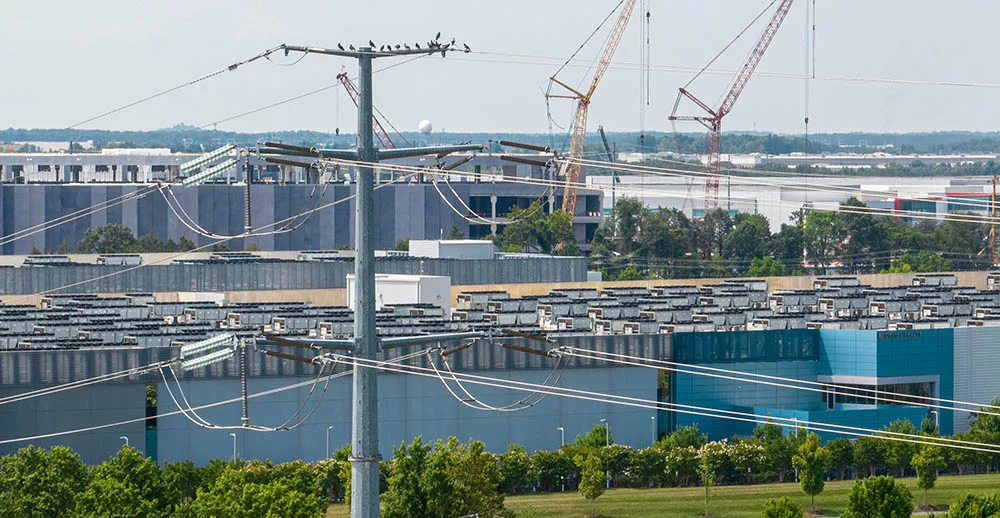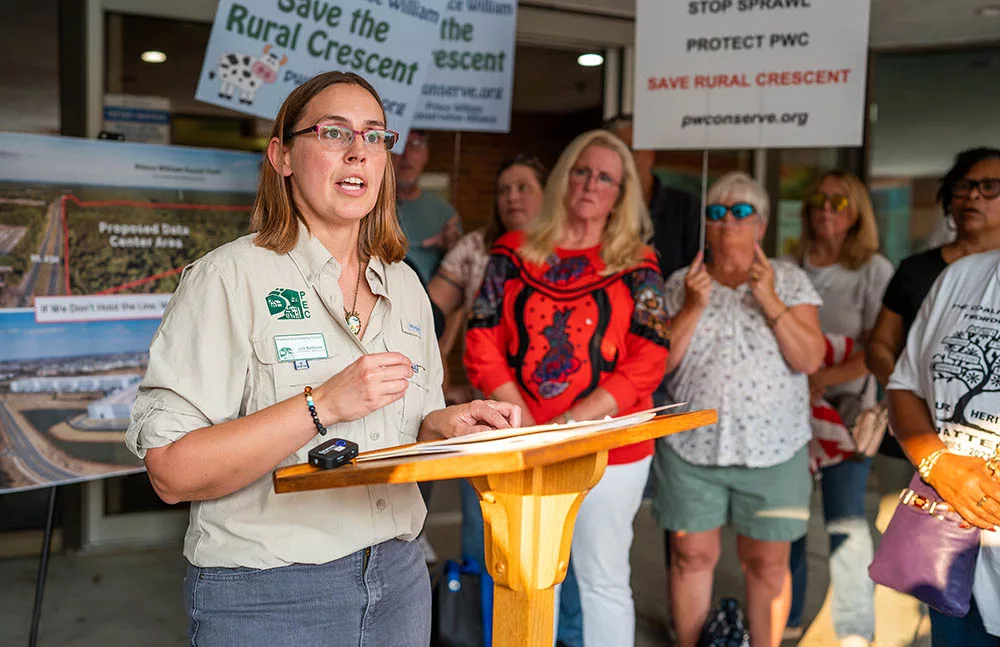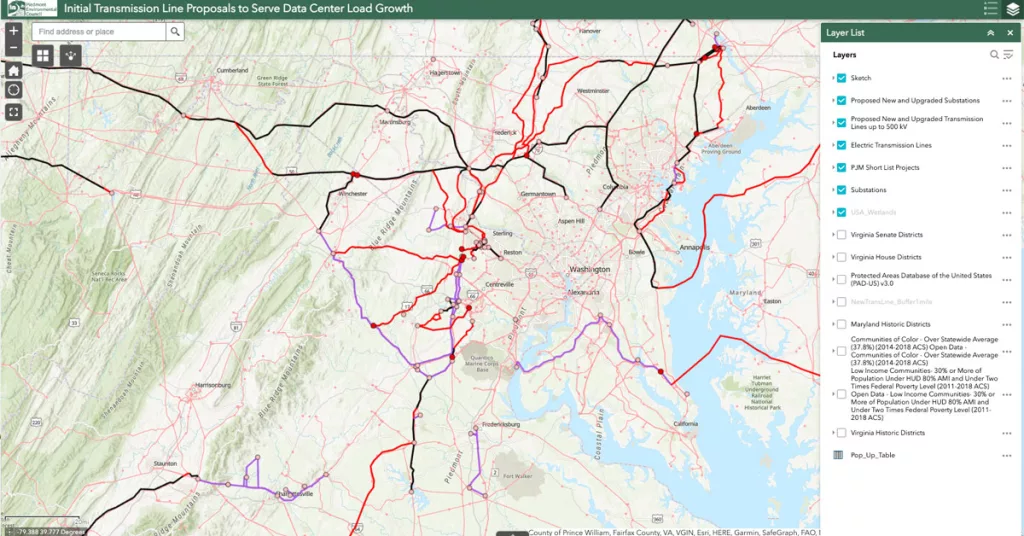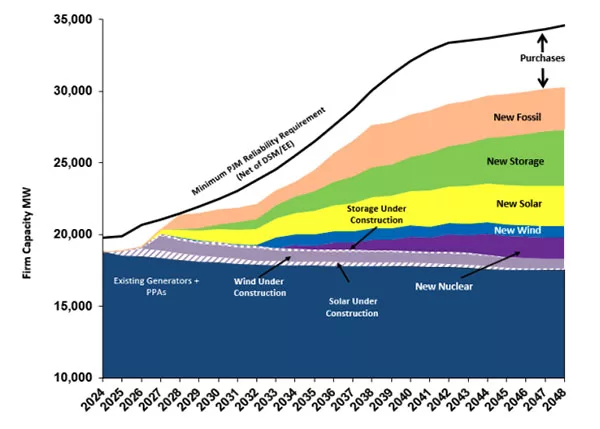The following text was sent out via email on September 28, 2023. Sign up for PEC email alerts →

Dear Supporter,
As director of land use here at The Piedmont Environmental Council, I’m accustomed to responding to major development proposals. However, I’ve never seen anything quite like this past year. The size, scale, and speed at which applications for data center projects are coming in and being approved is astounding.
Just this month, massive proposals moved forward in Culpeper, Louisa, and King George counties, with more being reviewed in Caroline and Stafford counties. Prince William, Loudoun, Fairfax, and Fauquier counties all have multiple active proposals for hyperscale data centers, which can demand hundreds of megawatts of power per campus. As an example, the data center campus just approved in King George County could total more than 1,200 MW alone.
As you may have deduced from the surge in data center headlines, things have been happening fast. Localities have rezoned thousands of acres for data center development, often with little scrutiny. Additionally, power contracts and water withdrawal and air quality permits are being lined up behind the scenes. The cumulative effect of all that’s being approved is not yet understood, and because many of these projects have yet to be constructed, communities are likely to discover important impacts far too late.
Virginia has to get a handle on this issue. So today I am writing to bring you up to speed on three efforts that PEC has underway to address the data center boom.
Raising Awareness:

First, we are working to shine a light on the explosive growth of the data center industry and pushing for more research, better planning, greater oversight, and appropriate mitigation when negative consequences can’t be avoided.
This summer, the Virginia Conservation Network released Our Common Agenda, detailing the policy agenda of more than 160 organizations across the Commonwealth. Our Common Agenda includes a briefing paper that I co-authored with Kyle Hart of the National Parks Conservation Association, titled “Mitigating Data Center Development’s Impacts.” In it, we ask policymakers to prioritize a comprehensive study of the impacts of data centers on the Commonwealth’s electrical grid, environment, historic and recreational resources, environmental justice, and ability to meet climate goals.
In August, in an effort to help our local planners better understand the potential repercussions arising from data center projects and how to appropriately regulate them, I gave a webinar called “Planning for the Digital Age” to the Virginia American Planning Association.
And earlier this month, PEC’s member newsletter featured a story on the rapidly evolving data center issue and the threat to our electric grid, state climate goals, water resources, local air quality, and land conservation efforts. In it, we encourage supporters to contact their local elected officials to demand better oversight of the data center industry.
Digging in on Potential Transmission Outcomes:

All of this power consumption is spurring a lot of new transmission proposals (all of which would be ratepayer-funded). PEC’s senior GIS analyst, Watsun Randolph, has consolidated maps recently released by PJM Interconnection, the region’s electrical transmission planning organization, to provide a look at some of the transmission line projects proposed by Dominion and other companies to accommodate data center demand growth through early 2022.
Our online web map has layers you can toggle to highlight potential impacts to conservation resources like parks, wildlife areas, land under easement and historic districts, among others.
Though we expect these proposals to change, this map reflects active proposals under consideration by PJM. We hope to learn more about which of these projects could move forward at upcoming meetings of PJM’s Transmission Expansion Advisory Committee on Oct. 3 or Oct. 31.
It’s important to note our map includes regional reliability projects arising from PJM’s load planning initiative, but does not include transmission resulting from more recent approvals or many of the local projects that Dominion is pursuing to bring power to specific data center proposals. We’re participating in ongoing transmission line stakeholder meetings for projects such as Germanna (a 230-kv line in Culpeper), Hornbaker (a 230-kv line in Prince William), and Golden to Aspen (a 500-kv line in Loudoun), among others.
Pushing for Better Planning from Dominion:

Also this month, PEC put together comments to the State Corporation Commission in response to Dominion Energy’s 2023 Integrated Resource Plan. In it, we argue that Dominion’s proposed IRP puts company profits over ratepayers and the needs and desires of Virginians. We asked the SCC to reject the plan in full, and require that Dominion:
- Use an independent third party to redo its load forecast based on scenarios that better incorporate market and technological trends, local land use approvals, and load expectations for existing, approved and proposed data centers.
- Develop a new approach for the 15-year planning horizon that is in line with the Virginia Clean Economy Act and appropriately allocates the cost of the unique power demands of the data center industry, and promotes reasonable prices, reliable service, energy independence, and environmental quality.
Related to the Dominion IRP, last week I wrote a Letter to the Editor of the Richmond Times Dispatch responding to Dominion’s recent revelation of signed energy contracts with data center companies totaling 13 gigawatts of additional expected power demand. I hope you’ll give it a read!
PEC staff and our many incredible partners are working hard on this issue to protect Virginians, but we need your help elevating the issue with elected officials. Please join us in writing letters, speaking up at meetings, and telling your legislators it’s a priority for you. We also need financial support to sustain this effort, which we expect to be long and difficult. As PEC President Chris Miller, wrote in a recent letter to our membership, “The volume of major land use proposals threatens everything we’ve achieved together over the past 50 years… We need your support now more than ever.”
I hope you’ll take a look at the resources we’ve provided today and, if possible, consider a targeted donation in 2023 or early in 2024 to help on this campaign.
Sincerely,
Julie Bolthouse
Director of Land Use
jbolthouse@pecva.org
540-347-2334 ext. 7042
